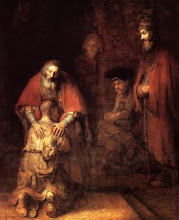 In Leif Enger's novel Peace Like a River, one of the characters asks this question: "Is it hubris to believe we all live epics?" That question resonates with me perhaps because, in my general estimation, our lives are really rather drab and meaningless without some adventurous or "odyssey-driven" context to place them within.
In Leif Enger's novel Peace Like a River, one of the characters asks this question: "Is it hubris to believe we all live epics?" That question resonates with me perhaps because, in my general estimation, our lives are really rather drab and meaningless without some adventurous or "odyssey-driven" context to place them within.In my midlife years I find my fingers flipping back to the Old Testament book of Ecclesiastes more often than they had in my salad days, sometimes to frankly whine along with Solomon in his sardonic musings concerning the meaning of life. Though, in my better hours, I fall into the invariable and more predictable safety of the conclusion that, apart from God, there is only bitterness, a misty vanity, a chasing after the elusive soap bubbles borne on the winds.
Over fourteen years ago, our family moved to Almaty, Kazakhstan. Historically, this was an incredible time in the world. The Berlin Wall had just come down, and vast areas of the "Evil Empire" were now open to the advance of the gospel. In the pre-9/11 days, reaching out to Muslims with the love of Christ was an easier sell than in the heat of today's blast of cold-hearted assumptions and limited missiological horizons. Initially, it seemed I was on the crest of some wave of warrior service for God, slaying dragons under the banner of "Timurzhan." (A family we worked with had a housekeeper and language helper who gave us all new names upon our arrival. Mine could be translated "Iron Soul" in the Kazakh language, I was told.) After the trials of three years of cross-cultural living in Central Asia and spiritual immaturity took their toll, I came to discover I was composed of far weaker metal. As Dickens would put it, these were years best characterized as "the best of times and the worst of times." They were rich times because God was doing His faithful work as the Refiner of His children as we experienced an awesome and undeserved privilege; they were painful because I left that "warrior service" disappointed in myself and extremely ambivalent about what it meant to hitch your star to His clarion call to "stretch your tent curtains wide, to lengthen the cords, and strengthen the stakes" (Is. 54:2-3), merely to arrive at a soul-aching barrenness which only additional wilderness wanderings with my Shepherd could assuage.
Commenting on Jesus' first miracle at Galilee (the changing of water to wine), Michael Card makes this observation:
"When we examine the miracles, a consistent image of Jesus of Nazareth comes into view. It makes sense that the One who refused to grasp equality with God would perform most of his miracles in such an unmiraculous, almost hidden way. It fits the paradox of his life. Power through weakness, wisdom through foolishness, total victory through bloody defeat...The wedding at Cana teaches us that he is ready to transform every ordinary element in our lives into the glorious stuff of miracles. But this first miracle prepares us for the fact that the world around us will usually fail to appreciate or even see it at all."

I guess I'm taking the epic route, as Odysseus or Frodo would, to simply say I'm learning to accept the mundane reality of the journey for what it is. There is still wonder and splendor in a quiet prayer or a small fraction-step towards humility and contrition in a strained relationship. It may not bear the sweaty scent of "warrior labor," but it is nevertheless epic in its scope. The warning to the prophet Zechariah to not despise the day of small things (Zech. 4:10) still rings true today...even for a sardonic Timurzhan!


